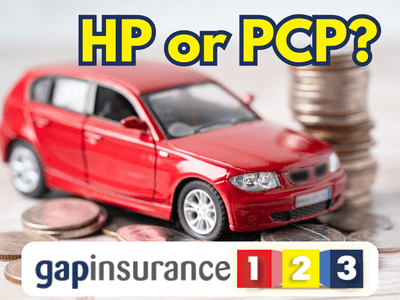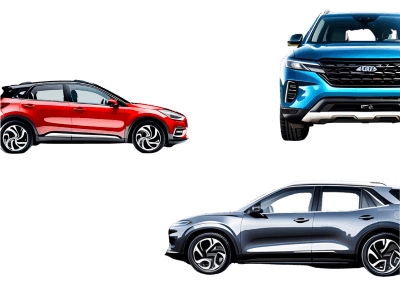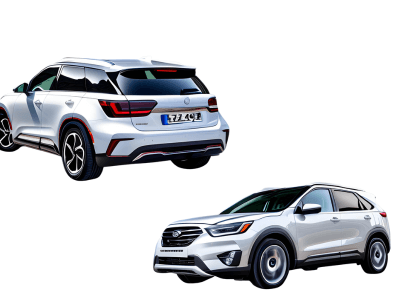Call Monday-Friday 9am - 6pm Closed Saturday & Sunday
Please select some policies.



Need Help? Calling from a mobile please call 0151 647 7556
0800 195 4926 / 0151 647 7556Do you have a question? or need help?
Call Monday-Friday 9am - 6pm Closed Saturday & Sunday,
When purchasing a new car, you'll likely encounter two popular car finance options: Personal Contract Purchase (PCP) and Hire Purchase (HP).
Here we will discuss the critical differences between PCP and HP, their pros and cons, and answer some common questions to help you decide which financing option is best for you.
PCP car finance vs HP Car Finance: Pros and Cons

Personal Contract Purchase (PCP) is a type of car finance agreement where you typically pay a deposit, followed by low monthly payments over a set period (usually 2 to 4 years).
At the end of the agreement, you have three options:
1. Lower monthly payments: PCP deals often come with a lower monthly payment compared to HP, making it more affordable in the short term. This is because you're only paying for a proportion of the vehicle price during the contract term rather than the car's entire value.
2. Flexibility at the end of the agreement: With PCP, you can choose between buying the car, returning it, or trading it in for a new deal. This allows you to adapt to changes in your financial situation or preferences.
3. Option to buy or return the car: If the car's value at the end of the contract is higher than the final balloon payment, you can benefit from the equity. You can buying the car outright or using the equity as a deposit for a new car.
4. Less risk of negative equity: Since the finance company takes on the risk of the car's depreciation, you are less likely to end up in negative equity with PCP than with other financing options.
1. Mileage restrictions: PCP agreements usually come with annual mileage limits, and exceeding these can result in penalty charges or affect the car's final value.
2. Potential for higher overall cost: While monthly payments may be lower, the total cost of a PCP deal can be higher than HP, especially if you decide to purchase the car in the end.
Bear in mind also that you pay interest on the final balloon payment (known as the Guaranteed Future Value (GFV) or Minimum Guaranteed Future Value (MGFV)
3. No outright ownership until final balloon payment: You will only own the car once you make the final balloon payment, which can be a considerable lump sum.
PCP may not be the best option for high-mileage drivers due to the annual mileage restrictions and potential penalty charges. However, you can negotiate a higher mileage cap with the finance company at the beginning of the agreement.
Whether PCP is a good idea depends on your circumstances and preferences. If you enjoy driving a new car every few years, appreciate lower monthly payments, and don't mind not owning the vehicle outright during the agreement, PCP could be a suitable option.

Hire Purchase (HP) is a car finance option where you pay an initial deposit, followed by fixed monthly repayments over a set period (usually 3 to 5 years). At the end of the agreement, you own the car outright, with no additional payments required.
1. Straightforward financing: HP is a simple and easy-to-understand financing option, making it appealing to those who prefer a more traditional approach to car finance.
2. Outright ownership at the end of the agreement: With HP, you will own the car outright once all the payments have been made, giving you complete control and no further financial obligations.
3. No mileage restrictions: Unlike PCP, HP agreements do not have mileage restrictions, making it a more suitable option for high-mileage drivers.
4. More control over the car: Since you will own the vehicle outright at the end of the HP agreement, you can modify or customize the car as you see fit.
1. Higher monthly payments: HP deals typically come with higher monthly payments than PCP, as you pay for the entire car value over the finance term.
2. Larger initial deposit required: HP agreements often require a larger initial deposit than PCP deals, which may be a barrier for some buyers.
3. No option to return the car at the end: Unlike PCP, there is no option to return the vehicle at the end of the HP agreement, which may be a disadvantage if your circumstances change.
HP can be an excellent way to buy a car if you prefer a simple financing option, plan to keep the car for a long time and don't mind making higher monthly payments.
The lack of mileage restrictions and outright ownership at the end of the agreement can also appeal to many buyers.
Main differences
1. Monthly payments: PCP generally has lower monthly payments than HP, making it more affordable in the short term. 
2. Ownership and end-of-agreement options: With PCP, you have the flexibility to buy the car, return it, or trade it in for a new deal at the end of the contract, while HP results in outright ownership once all payments have been made.
3. Mileage restrictions: PCP usually has mileage restrictions, whereas HP does not.
4. Total cost: The total cost of a PCP deal can be higher than HP, particularly if you decide to purchase the car at the end of the agreement.
There is no right answer to this question. You will have to look at your individual preferences, financial situation, and driving habits.
1. Financial situation: Assess your budget and determine whether you can afford higher monthly payments with HP or prefer the lower payments of PCP.
2. Driving habits and needs: Consider your annual mileage and whether you need a financing option with more flexibility or no mileage restrictions.
3. Preference for ownership: If owning the car outright is important to you, HP may be the better choice, while PCP offers more options at the end of the agreement.
4. Individual circumstances: Evaluate any factors unique to your situation, such as the desire to change cars frequently or the need for a financing option that accommodates changes in your financial circumstances.
Both PCP and HP car finance options have pros and cons, and your best choice will depend on your individual needs and preferences.
By understanding the key differences between the two options and considering your circumstances, you can make an informed choice that best suits your situation.
If you need help deciding which financing option to choose, looking through expert guides online for advice is always a good idea.
There are a number of types of GAP Insurance that can be used on a Personal Contract Purchase or Hire Purchase finance agreement.
The most popular is a Combined Return to Invoice policy. This type of GAP Insurance is designed to cover you between the motor insurers' market value settlement and the higher of the outstanding finance settlement or the original Invoice price you paid.
When you have a new vehicle, particularly when you expect the replacement cost to rise, the 3-in-1 Combined Vehicle Replacement GAP Insurance from GAPInsurance123 is probably the most comprehensive GAP product in the market. This is designed to cover you between the motor insurers' settlement and the higher of the outstanding finance settlement, the original invoice price you first paid or the cost of the equivalent replacement vehicle at the time you make the claim.
So if the replacement cost has risen to, say, £35,000 and the original invoice price was £32,000, then it is the £35,000 you can be covered too.
Yes, both PCP and HP finance agreements can typically be settled early. However, there may be early settlement fees or penalties, depending on the terms of your agreement. It's essential to read your contract carefully and consult with the finance company to understand any costs involved in early repayment.
If you damage your car during the finance agreement, you will need to have it repaired. You may need to involve an insurance claim if the damage is significant. Maintaining the car in good condition throughout the agreement is essential, as excessive damage can affect the car's value and potentially lead to additional charges at the end of a PCP contract.
You can look to protect against the costs of cosmetic repairs with the likes of Tyre & Alloy Wheel Insurance or Alloy Wheel & Minor cosmetic repair Insurance from GapInsurance123.
Yes, you can often negotiate the terms of your PCP or HP agreement, including the deposit, monthly payments, interest rates, and mileage limits (for PCP). Shopping around and comparing different deals is essential to ensure you're getting the best terms possible.

Transferring a PCP or HP agreement to another person is not allowed without the finance company's consent. If you wish to transfer the agreement, you must contact the finance company to discuss the process and any potential fees or requirements involved.
It is possible to get PCP or HP finance with bad credit, but it may be more challenging and result in higher interest rates. Some specialist lenders cater to those with poor credit histories, but it's essential to compare deals carefully and consider the overall cost of borrowing.
A deposit is usually required for both PCP and HP finance, although the amount may vary depending on the specific deal and your credit rating.
In some cases, dealerships or finance companies may offer no-deposit deals, which can result in higher monthly payments and may only be available to some applicants.
Motor manufacturers often also offer contributions towards a deposit on PCPs, called a Finance Deposit Allowance (FDA).
Besides PCP and HP finance, other car finance options include:
Each option has pros and cons; the best deal will depend on your needs and financial situation.
HP and PCP finance agreements have been offered in car dealerships for some time. However, you may be forgiven for thinking that motor manufacturers favour PCP as the preferred method of purchase.
And with good reason.
Personal Contract Purchase agreements provide advantages over Hire Purchase for motor dealers and manufacturers.
A shorter buying cycle - PCP agreements are typically no more than 48 months; most are less. Hire Purchase can be up to 60 months. This will provide a shorter buying cycle for the customer and, potentially, give the dealer less time to make another sale.
A more precise timeframe to offer a new deal - the motor dealer knows when the PCP deal ends. This means they know when the customer will be in the perfect position to change to their next car.
The motor dealer will typically look to contact the customer up to 12 months before their contract ends. An advantageous deal, like 'get a new car and your payments stay the same', can shorten the buying cycle even more.
Better used car stock supply- by shortening the buying cycle, the motor dealer keeps up the sales figures for new cars and provides a line of part exchange stock for their forecourts. Often they can get a steady supply of used cars under manufacturers' warranty by this shorter cycle method.
Published 6/5/2023, written by Mark Griffiths